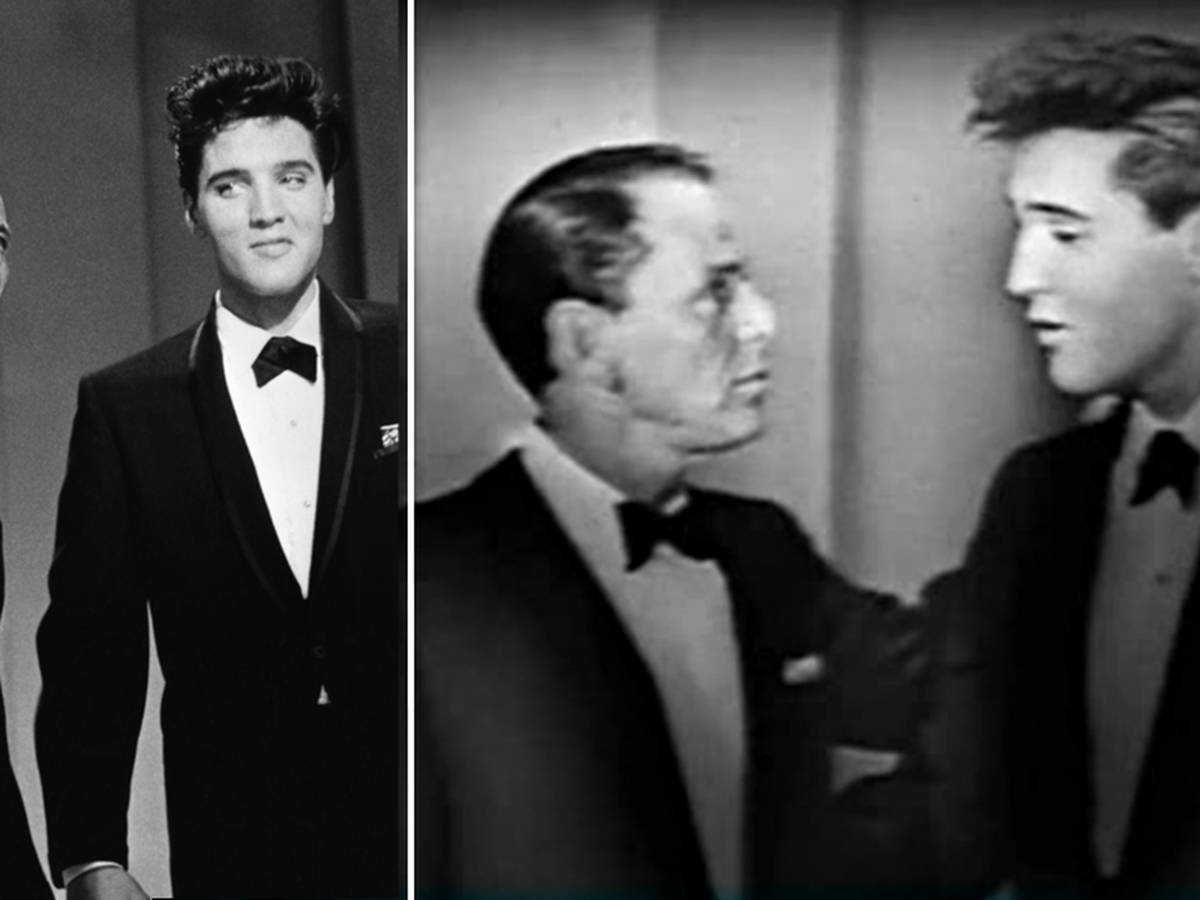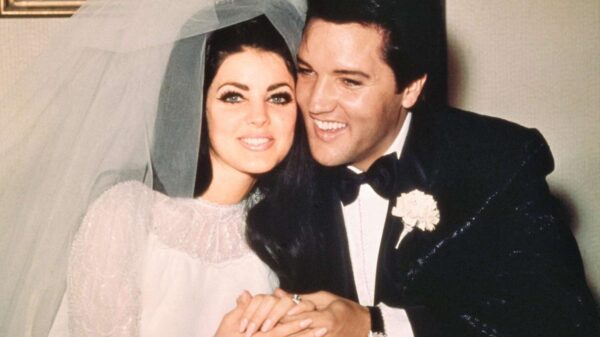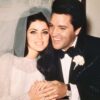Introduction
In the pantheon of 20th-century American entertainment, few figures loom as large as Frank Sinatra and Elvis Presley.
Their relationship, spanning decades, embodied the seismic shifts in American popular music and culture during the 1950s and 1960s.
Sinatra, the epitome of sophisticated jazz and traditional pop, represented the established order of American entertainment.
Elvis, with his provocative movements and revolutionary sound, heralded a new era that would forever change the landscape of popular music.
Their story is one of initial antagonism that gradually evolved into a complex web of professional respect, personal tensions, and family connections.
Early Conflicts (1950s)
Sinatra’s Public Criticism of Rock ‘n’ Roll
The battle lines between the old guard and the new wave were drawn clearly in 1957 when Frank Sinatra penned a scathing critique of rock and roll for the French magazine Western World.
His words reflected not just personal distaste but a generational resistance to cultural change.
In his article, Sinatra didn’t mince words, describing rock and roll as “the most brutal, ugly, degenerate, vicious form of expression” he had ever encountered.
His criticism was particularly pointed when addressing the genre’s impact on youth culture.
“It fosters almost totally negative and destructive reactions in young people,” Sinatra wrote.
“It smells phoney and false.”
His most colorful condemnation came when he described the genre as a “rancid-smelling aphrodisiac,” performed by “cretinous goons” through “imbecilic reiterations and sly, lewd – in plain fact, dirty – lyrics.”
Sinatra’s critique went beyond mere musical preferences; he saw rock and roll as a moral threat, describing it as “the martial music of every side-burned delinquent on the face of the earth.”
His specific attacks on Elvis’s music labeled it as “deplorable” and accused it of fostering “universally negative and destructive directions in young people.”
Elvis’s Diplomatic Response
Despite the harshness of Sinatra’s criticism, Elvis Presley’s response demonstrated a maturity and diplomacy that might have surprised his critics.
When shown the article by a reporter, Elvis replied with remarkable restraint: “He has a right to his opinion, but I can’t see him knocking it for no good reason.
I admire him as a performer and an actor, but I think he’s badly mistaken about this.”
Elvis went further, drawing a shrewd parallel between his own situation and Sinatra’s early career: “If I remember correctly, he was also part of a trend.
I don’t see how he can call the youth of today immoral and delinquent.”
Defending his genre, Elvis added, “It’s the greatest music ever, and it will continue to be so.
I like it, and I’m sure many other people feel the same way.”
Professional Intersections
The relationship between these two titans of American music took an unexpected turn with “The Frank Sinatra Timex Show: Welcome Home Elvis.”
Following Presley’s discharge from the army, Sinatra, despite his previous criticism of rock and roll, hosted a special welcoming the King back to civilian life.
The highlight of the show was a symbolic musical exchange: Elvis performed Sinatra’s “Witchcraft” while Sinatra took on “Love Me Tender.”
This moment represented more than just a television special; it was a symbolic bridging of the generational and musical divide that had separated them.
Working Relationships
The professional connections between the Sinatra and Presley camps extended beyond this initial collaboration.
Elvis went on to star alongside Nancy Sinatra in the 1968 film “Speedway,” which featured the song “A Little Less Conversation.”
This track would later become a posthumous hit for Presley, adding another layer to the intertwined legacy of these two entertainment dynasties.
The Nancy Sinatra Connection
Early Interactions
The relationship between Elvis and Nancy Sinatra added another complex layer to the Presley-Sinatra dynamic.
Their connection became public when Elvis returned from his military service, with Nancy presenting him with linen shirts on the runway, announcing they were “from my father.”
This seemingly innocent gesture marked the beginning of a relationship that would cause considerable anxiety for Elvis.
Elvis’s Inner Turmoil
Private letters from Elvis to his spiritual advisor, Carmen Montez, revealed the deep concerns he harbored about his involvement with Nancy Sinatra.
According to Gary Lindberg’s book “Letters From Elvis,” the King was “increasingly fearful of the heavy-handed tactics of Frank Sinatra and his mob connections.”
Elvis confided in Montez that “toying with Frank’s daughter seemed like playing with fire.”
His fears weren’t unfounded.
Elvis later expressed regret over his choice of “playmate” in Nancy, whom he considered “particularly dangerous.”
His predicament was complicated by his inability to easily extract himself from the situation.
As Carmen revealed, Elvis was “afraid of making enemies, especially ones in the Mafia.”
Continued Involvement
Despite Elvis’s attempts to distance himself, Nancy Sinatra remained a significant presence in his life.
Their professional collaboration in “Speedway” kept them in close proximity, and Nancy even threw a baby shower for Elvis’s wife, Priscilla.
The situation created tension in Elvis’s marriage, with Priscilla later confessing in her memoir “Elvis and Me”: “I became more and more resigned to the fact that Elvis was dating Nancy Sinatra and had completely forgotten about me.”
Behind-the-Scenes Drama
The Juliet Prowse Triangle (1960)
Perhaps the most dramatic chapter in the Sinatra-Presley saga involved Juliet Prowse, who found herself at the center of a potential scandal during the filming of “G.I. Blues” in 1960.
While dating Sinatra, Prowse co-starred with Elvis, leading to a series of close encounters that nearly exposed their relationship to Sinatra himself.
Elvis’s entourage would regularly pound on his dressing room door, jokingly warning of Sinatra’s approach.
As bodyguard Red West recalled, “Hey, Elvis, quick, here comes Frank!” became a running gag.
However, this joke nearly backfired when Sinatra actually visited the set.
Despite West’s genuine warning, Elvis, having grown tired of the prank, ignored it.
Sinatra entered the room but fortunately didn’t discover anything compromising.
Prowse later attempted to downplay the situation, stating, “I had a date or two with Elvis — he’s a nice, polite chap — but we’re definitely not a steady item as some columnists say.”
She maintained that her relationship with Sinatra was one of “good friends” and dismissed any notion of a love triangle as “ridiculous.”
She added a mature perspective: “Frank and I are mature people.
We don’t go for this teenage bit about going steady and all that jazz.”
Analysis and Legacy
The relationship between Frank Sinatra and Elvis Presley embodied the changing face of American entertainment in the mid-20th century.
Their initial antagonism, rooted in Sinatra’s resistance to rock and roll, gradually evolved into a complex relationship marked by professional respect and personal entanglements.
Sonny West, a member of Elvis’s Memphis Mafia, offered perhaps the most insightful analysis of the underlying tension: “I’ve always felt Ol’ Blue Eyes was just a little jealous of Elvis because he dared to steal the mantle of teen idol and usurp Sinatra’s popularity.
While Sinatra was the idol of millions of bobby-soxers in the 1940s, Elvis became the gold standard by which every entertainer was measured.”
Their story represents more than just a personal rivalry; it chronicles the transition of American popular music from the sophisticated, controlled performances of the post-war era to the raw, emotional energy of rock and roll.
Despite their differences, both men left an indelible mark on American entertainment, their legacies intertwined through music, movies, and personal connections that would influence popular culture for generations to come.
Read more



